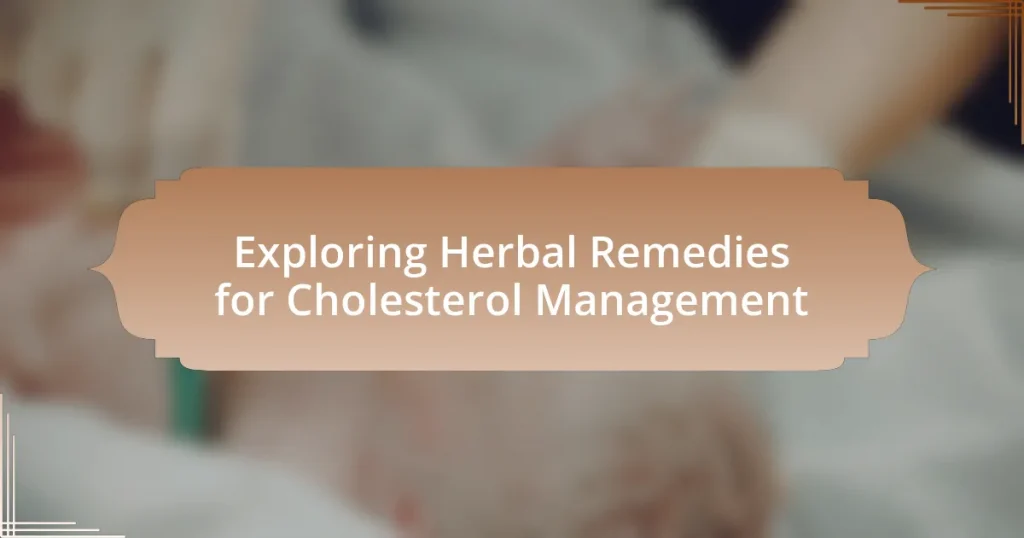Herbal remedies for cholesterol management encompass natural substances that can effectively lower cholesterol levels, such as garlic, psyllium husk, and red yeast rice. These remedies differ from conventional treatments like statins in their composition and mechanisms of action, often utilizing multiple pathways to improve lipid profiles. Key ingredients, including turmeric and ginger, also contribute to cholesterol management by enhancing lipid metabolism and reducing LDL cholesterol. The article emphasizes the importance of cholesterol management for overall health, outlines potential risks associated with high cholesterol levels, and discusses lifestyle changes that can complement herbal treatments for optimal cardiovascular health.

What are Herbal Remedies for Cholesterol Management?
Herbal remedies for cholesterol management include several natural substances known to help lower cholesterol levels. For instance, garlic has been shown to reduce total cholesterol and LDL cholesterol levels, with studies indicating a reduction of up to 10-15% in LDL cholesterol when consumed regularly. Another effective remedy is psyllium husk, which is rich in soluble fiber; research has demonstrated that it can lower cholesterol levels by binding to bile acids in the intestines, promoting their excretion. Additionally, red yeast rice contains monacolin K, which has been found to inhibit cholesterol synthesis in the liver, similar to statin medications, and can lead to significant reductions in LDL cholesterol. These herbal remedies are supported by various studies that highlight their efficacy in managing cholesterol levels.
How do herbal remedies differ from conventional treatments for cholesterol?
Herbal remedies differ from conventional treatments for cholesterol primarily in their composition and mechanism of action. Conventional treatments, such as statins, are pharmaceutical drugs that specifically target cholesterol synthesis in the liver, effectively lowering LDL cholesterol levels and reducing cardiovascular risk. In contrast, herbal remedies, like garlic or red yeast rice, often contain a variety of bioactive compounds that may help manage cholesterol levels through multiple pathways, including antioxidant effects and improving lipid metabolism.
For instance, a study published in the Journal of Clinical Lipidology found that red yeast rice can lower LDL cholesterol due to its natural statin content, while garlic has been shown to have a modest effect on cholesterol levels through its sulfur-containing compounds. This highlights that while both approaches aim to manage cholesterol, their methods and ingredients significantly differ.
What are the key ingredients commonly found in herbal remedies for cholesterol?
Key ingredients commonly found in herbal remedies for cholesterol include garlic, turmeric, ginger, and psyllium husk. Garlic contains allicin, which has been shown to lower total cholesterol and LDL levels. Turmeric, with its active compound curcumin, has anti-inflammatory properties that can improve heart health and reduce cholesterol levels. Ginger is known to enhance lipid metabolism, potentially lowering cholesterol. Psyllium husk is a soluble fiber that can help reduce cholesterol absorption in the intestines. These ingredients are supported by various studies highlighting their effectiveness in managing cholesterol levels.
How do these ingredients contribute to cholesterol management?
Certain herbal ingredients contribute to cholesterol management by lowering LDL (low-density lipoprotein) levels and increasing HDL (high-density lipoprotein) levels. For instance, garlic has been shown to reduce total cholesterol levels by approximately 10-15% in various studies, primarily due to its active compound, allicin, which inhibits cholesterol synthesis in the liver. Similarly, psyllium husk, a soluble fiber, can lower LDL cholesterol by binding to bile acids in the intestine, promoting their excretion and thus reducing cholesterol absorption. Additionally, plant sterols and stanols, found in various herbs, compete with cholesterol for absorption in the digestive system, effectively lowering overall cholesterol levels. These mechanisms demonstrate how specific herbal ingredients can play a significant role in managing cholesterol levels effectively.
Why is cholesterol management important for overall health?
Cholesterol management is crucial for overall health because it helps prevent cardiovascular diseases, including heart attacks and strokes. High levels of low-density lipoprotein (LDL) cholesterol can lead to plaque buildup in arteries, increasing the risk of atherosclerosis. According to the American Heart Association, managing cholesterol levels through lifestyle changes and, if necessary, medication can significantly reduce the risk of heart disease. Furthermore, maintaining healthy cholesterol levels supports overall metabolic function and reduces the likelihood of developing conditions such as diabetes and hypertension.
What are the risks associated with high cholesterol levels?
High cholesterol levels significantly increase the risk of cardiovascular diseases, including heart attacks and strokes. Elevated low-density lipoprotein (LDL) cholesterol can lead to the buildup of plaques in arteries, a condition known as atherosclerosis, which narrows blood vessels and restricts blood flow. According to the American Heart Association, individuals with high cholesterol are twice as likely to develop heart disease compared to those with normal levels. Additionally, high cholesterol can contribute to hypertension and peripheral artery disease, further complicating cardiovascular health.
How can managing cholesterol improve cardiovascular health?
Managing cholesterol can significantly improve cardiovascular health by reducing the risk of heart disease and stroke. High levels of low-density lipoprotein (LDL) cholesterol can lead to plaque buildup in arteries, which narrows them and restricts blood flow. According to the American Heart Association, lowering LDL cholesterol levels can decrease the risk of coronary artery disease by up to 30-40%. Additionally, maintaining healthy cholesterol levels can improve overall heart function and reduce the likelihood of heart attacks.

What are the most effective herbal remedies for cholesterol management?
The most effective herbal remedies for cholesterol management include garlic, turmeric, and psyllium. Garlic has been shown to reduce total cholesterol and LDL cholesterol levels, with studies indicating a reduction of up to 10-15% in LDL cholesterol when consumed regularly. Turmeric, containing curcumin, has anti-inflammatory properties that can improve lipid profiles, while research suggests it may lower cholesterol levels by 4-29%. Psyllium, a soluble fiber, can help lower cholesterol by binding to bile acids in the intestine, leading to a reduction in total cholesterol levels by approximately 5-10% when taken daily.
How does garlic influence cholesterol levels?
Garlic has been shown to lower total cholesterol and LDL (low-density lipoprotein) cholesterol levels. Research indicates that garlic contains compounds such as allicin, which can inhibit cholesterol synthesis in the liver and enhance the excretion of cholesterol. A meta-analysis published in the Journal of Nutrition in 2016 found that garlic supplementation significantly reduced total cholesterol levels by an average of 17 mg/dL and LDL cholesterol by 9 mg/dL in individuals with high cholesterol. This evidence supports the role of garlic as an effective herbal remedy for cholesterol management.
What studies support garlic’s effectiveness in cholesterol management?
Several studies support garlic’s effectiveness in cholesterol management. A meta-analysis published in the Journal of Nutrition in 2016, which reviewed 39 randomized controlled trials, found that garlic supplementation significantly reduced total cholesterol levels by an average of 17 mg/dL and LDL cholesterol by 9 mg/dL. Another study in the American Journal of Clinical Nutrition in 2000 demonstrated that aged garlic extract lowered total cholesterol and triglycerides in participants with high cholesterol levels. Additionally, a systematic review in the Cochrane Database of Systematic Reviews in 2013 confirmed that garlic can lead to a modest reduction in cholesterol levels, particularly in individuals with elevated cholesterol. These studies collectively indicate that garlic can be an effective natural remedy for managing cholesterol levels.
What is the recommended dosage of garlic for cholesterol control?
The recommended dosage of garlic for cholesterol control is typically 600 to 1,200 milligrams of garlic extract per day. This dosage has been supported by various studies, including a meta-analysis published in the Journal of Nutrition, which found that garlic supplementation can lead to significant reductions in total cholesterol and LDL cholesterol levels. The effectiveness of garlic in managing cholesterol is attributed to its active compounds, such as allicin, which have been shown to influence lipid metabolism.
What role does ginger play in cholesterol management?
Ginger plays a significant role in cholesterol management by helping to lower total cholesterol and triglyceride levels. Research indicates that ginger can reduce low-density lipoprotein (LDL) cholesterol, often referred to as “bad” cholesterol, while potentially increasing high-density lipoprotein (HDL) cholesterol, known as “good” cholesterol. A study published in the “Journal of Nutrition” found that ginger extract significantly reduced cholesterol levels in participants, demonstrating its effectiveness as a natural remedy for managing cholesterol.
How does ginger affect lipid profiles in the body?
Ginger positively affects lipid profiles in the body by reducing total cholesterol and triglyceride levels. Research indicates that ginger extract can significantly lower low-density lipoprotein (LDL) cholesterol while increasing high-density lipoprotein (HDL) cholesterol. A study published in the Journal of Nutrition in 2018 demonstrated that participants consuming ginger experienced a notable decrease in lipid levels, supporting its role in cholesterol management. This evidence highlights ginger’s potential as a natural remedy for improving lipid profiles and promoting cardiovascular health.
What are the best ways to consume ginger for cholesterol benefits?
The best ways to consume ginger for cholesterol benefits include fresh ginger root, ginger tea, and ginger supplements. Fresh ginger root can be grated and added to meals or smoothies, providing a direct source of its active compounds, such as gingerol, which have been shown to lower cholesterol levels. Ginger tea, made by steeping fresh ginger in hot water, offers a soothing way to incorporate ginger into the diet while also benefiting from its cholesterol-lowering properties. Additionally, ginger supplements, available in capsule or powder form, provide a concentrated dose of ginger’s beneficial compounds, making it easier to achieve the desired effects on cholesterol. Studies have indicated that ginger can significantly reduce total cholesterol and triglyceride levels, supporting its use as a natural remedy for cholesterol management.

What are the potential side effects and considerations of using herbal remedies?
Herbal remedies can cause various side effects and require careful consideration before use. Common side effects include gastrointestinal issues, allergic reactions, and interactions with prescription medications, which can lead to adverse effects or reduced efficacy of conventional treatments. For instance, St. John’s Wort can interfere with antidepressants and birth control pills, while garlic supplements may increase bleeding risk when taken with anticoagulants. Additionally, the lack of regulation in herbal supplement manufacturing can result in variability in potency and purity, posing further risks. Therefore, individuals should consult healthcare professionals before starting any herbal remedy, especially those with pre-existing health conditions or those taking other medications.
Are there any risks associated with herbal remedies for cholesterol management?
Yes, there are risks associated with herbal remedies for cholesterol management. Herbal remedies can interact with prescription medications, leading to adverse effects or reduced efficacy of those medications. For example, red yeast rice, a common herbal supplement for cholesterol, contains monacolin K, which is chemically similar to the active ingredient in statin drugs and can cause muscle pain or liver damage when taken in excess. Additionally, some herbal products may contain contaminants or unlisted ingredients that can pose health risks. A study published in the Journal of the American College of Cardiology highlighted that herbal supplements often lack standardization, which can lead to variability in potency and safety.
What interactions should be considered when using herbal remedies with other medications?
When using herbal remedies with other medications, it is crucial to consider potential interactions that may affect the efficacy and safety of both the herbal remedy and the prescribed medication. For instance, St. John’s Wort can reduce the effectiveness of certain antidepressants, birth control pills, and anticoagulants by inducing liver enzymes that metabolize these drugs more quickly. Additionally, garlic supplements may enhance the effects of anticoagulants, increasing the risk of bleeding. Research indicates that ginkgo biloba can interact with anticoagulants and antiplatelet drugs, potentially leading to increased bleeding risk as well. Therefore, it is essential to consult healthcare professionals before combining herbal remedies with other medications to avoid adverse effects and ensure safe treatment outcomes.
How can individuals ensure safe use of herbal remedies?
Individuals can ensure safe use of herbal remedies by consulting healthcare professionals before starting any new treatment. This step is crucial because healthcare providers can assess potential interactions with existing medications and evaluate individual health conditions. Research indicates that certain herbal remedies can have side effects or interact negatively with prescription drugs; for example, St. John’s Wort can reduce the effectiveness of antidepressants. Additionally, individuals should source herbal products from reputable suppliers to avoid contamination and ensure quality, as the FDA does not regulate herbal supplements as strictly as pharmaceuticals.
What lifestyle changes can complement herbal remedies for cholesterol management?
Lifestyle changes that can complement herbal remedies for cholesterol management include adopting a heart-healthy diet, engaging in regular physical activity, maintaining a healthy weight, and avoiding tobacco smoke. A heart-healthy diet emphasizes fruits, vegetables, whole grains, and healthy fats, which can lower LDL cholesterol levels. Regular physical activity, such as aerobic exercise, can help raise HDL cholesterol and lower LDL cholesterol. Maintaining a healthy weight reduces the risk of high cholesterol, and avoiding tobacco smoke improves overall cardiovascular health. These lifestyle modifications are supported by research indicating that diet and exercise significantly impact cholesterol levels and heart health.
How does diet impact cholesterol levels alongside herbal remedies?
Diet significantly impacts cholesterol levels by influencing the types and amounts of fats consumed, which can either raise or lower cholesterol. For instance, diets high in saturated fats, commonly found in red meat and full-fat dairy products, can increase low-density lipoprotein (LDL) cholesterol, often referred to as “bad” cholesterol. Conversely, diets rich in unsaturated fats, such as those found in olive oil, avocados, and nuts, can help lower LDL cholesterol levels.
Herbal remedies can complement dietary changes in managing cholesterol. For example, garlic has been shown to reduce total cholesterol levels, while plant sterols and stanols, found in certain herbs, can block cholesterol absorption in the intestines. A study published in the Journal of Nutrition indicated that incorporating plant sterols into a diet can lower LDL cholesterol by 5-15%. Therefore, combining a heart-healthy diet with specific herbal remedies can enhance cholesterol management effectively.
What role does exercise play in enhancing the effects of herbal treatments?
Exercise significantly enhances the effects of herbal treatments by improving circulation and metabolic processes, which can increase the bioavailability of active compounds in herbs. For instance, physical activity promotes better blood flow, allowing herbal constituents to reach target tissues more effectively. Additionally, exercise can help regulate cholesterol levels independently, which may synergistically complement the cholesterol-lowering effects of certain herbal remedies, such as garlic and guggul. Studies have shown that combining exercise with herbal treatments can lead to greater reductions in LDL cholesterol and improvements in overall cardiovascular health, demonstrating the importance of an active lifestyle in maximizing the benefits of herbal interventions.
What practical tips can help individuals effectively use herbal remedies for cholesterol management?
To effectively use herbal remedies for cholesterol management, individuals should consider incorporating specific herbs known for their cholesterol-lowering properties, such as garlic, turmeric, and psyllium. Garlic has been shown to reduce total cholesterol levels by approximately 10-15% in some studies, while turmeric contains curcumin, which may help lower LDL cholesterol and improve overall heart health. Psyllium, a soluble fiber, can also help lower cholesterol levels by binding to bile acids in the intestines, promoting their excretion.
Additionally, individuals should consult with healthcare professionals before starting any herbal regimen to ensure safety and proper dosage, as some herbs may interact with medications or have contraindications. Regular monitoring of cholesterol levels is also essential to assess the effectiveness of the chosen herbal remedies.










